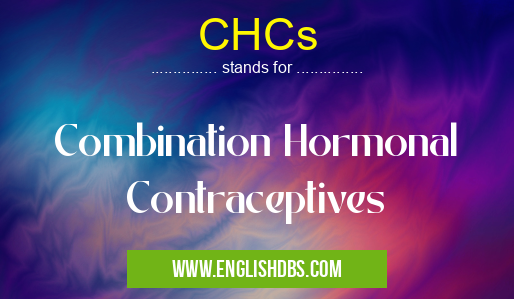What does CHCS mean in NURSING
Combination Hormonal Contraceptives (CHCs) are a type of birth control that combines two hormones: an estrogen and a progestin. CHCs work by preventing ovulation, thickening cervical mucus, and thinning the uterine lining. This makes it more difficult for sperm to reach the egg and for a fertilized egg to implant in the uterus.

CHCs meaning in Nursing in Medical
CHCs mostly used in an acronym Nursing in Category Medical that means Combination Hormonal Contraceptives
Shorthand: CHCs,
Full Form: Combination Hormonal Contraceptives
For more information of "Combination Hormonal Contraceptives", see the section below.
What are the different types of CHCs?
There are several different types of CHCs, including:
- Birth control pills: These are the most common type of CHC. They are taken by mouth once a day.
- Vaginal ring: This is a flexible ring that is inserted into the vagina for three weeks at a time.
- Contraceptive patch: This is a small patch that is applied to the skin once a week.
- Contraceptive injection: This is an injection that is given every three months.
- Implant: This is a small rod that is inserted under the skin of the upper arm. It lasts for up to three years.
How effective are CHCs?
CHCs are very effective at preventing pregnancy. When taken correctly, they are 99% effective.
What are the side effects of CHCs?
CHCs can cause a variety of side effects, including:
- Nausea
- Vomiting
- Headaches
- Breast tenderness
- Mood changes
- Weight gain
- Increased risk of blood clots
Who should not use CHCs?
CHCs are not right for everyone. Women who should not use CHCs include those who:
- Are pregnant
- Have a history of blood clots
- Have liver disease
- Have breast cancer
Essential Questions and Answers on Combination Hormonal Contraceptives in "MEDICAL»NURSING"
What are Combination Hormonal Contraceptives (CHCs)?
CHCs are birth control methods that combine two synthetic hormones: an estrogen and a progestin. They work by preventing ovulation and thickening cervical mucus to block sperm.
How effective are CHCs?
CHCs are highly effective when used correctly. With perfect use, they are over 99% effective at preventing pregnancy. However, typical use effectiveness is around 91% due to factors like missed pills or incorrect use.
What types of CHCs are available?
CHCs come in various forms, including:
- Pills (taken daily)
- Patches (applied weekly)
- Rings (inserted into the vagina for 3 weeks)
- Shots (given every 3 months)
- Implants (inserted under the skin for up to 5 years)
How do CHCs prevent pregnancy?
CHCs work by suppressing the pituitary gland's production of luteinizing hormone (LH) and follicle-stimulating hormone (FSH). These hormones are responsible for ovulation. By blocking ovulation, CHCs prevent the release of an egg from the ovary. They also thicken cervical mucus, making it difficult for sperm to reach the egg.
Are CHCs safe to use?
CHCs are generally safe for most women. However, certain medical conditions, such as blood clots, liver disease, and certain types of cancer, may make them unsuitable. It is crucial to consult with a healthcare provider before using CHCs to discuss potential risks and benefits.
Final Words: CHCs are a safe and effective way to prevent pregnancy. They are available in a variety of forms, so women can choose the one that best suits their needs. However, it is important to talk to a doctor about the risks and benefits of CHCs before starting to use them.
